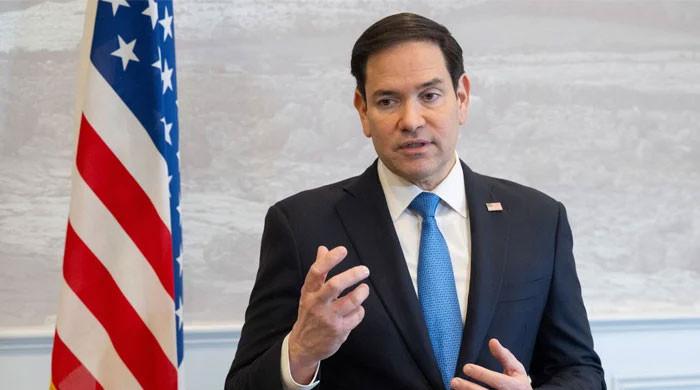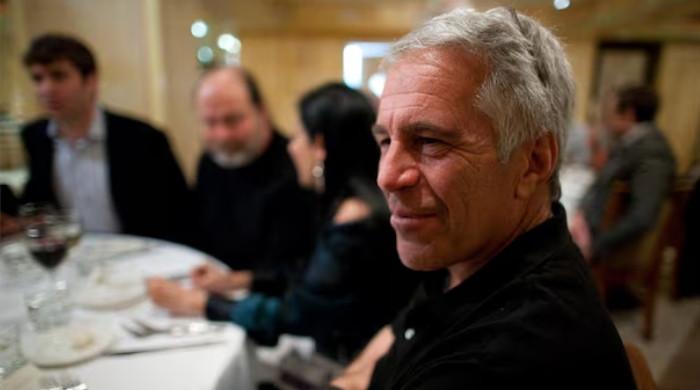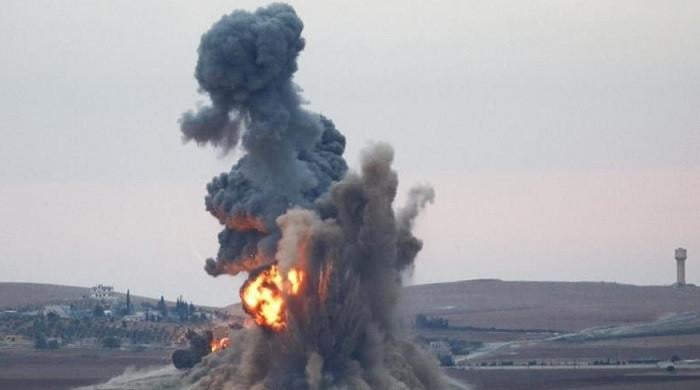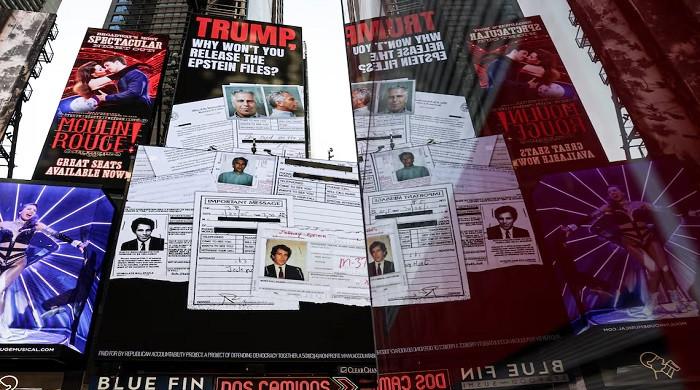Gaza braces for Israeli ground assault as US announces sending fighter jets
US deployments highlight goal of deterring any actions, whether states, non-state actors, that could further escalate situation
October 15, 2023
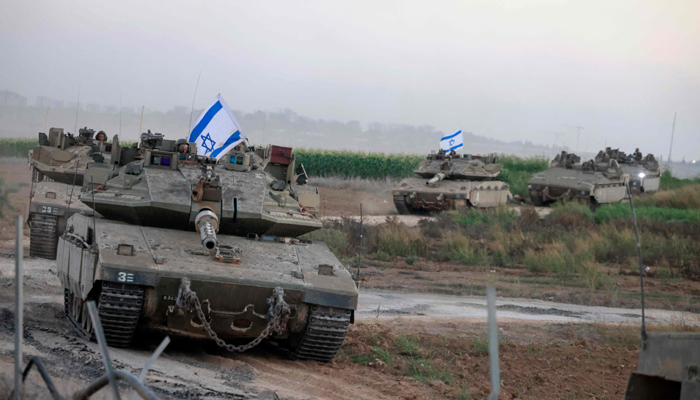
- Movements "part of our effort to deter hostile actions against Israel".
- President Biden speaks to Israeli PM, Palestinian President.
- Over 1,300 people were killed as a result of Hamas attack in Israel.
The US defence secretary stated that the US has ordered a second carrier strike group and air force fighter jets to the eastern Mediterranean Sea to demonstrate its firm support for Israel which is preparing for a ground assault on Gaza.
Israel's brutality continues in Gaza as the death toll in indiscriminate bombing and shelling in Gaza has gone past 2,670, with over 9,200 Palestinians injured, the Ministry of Health reported.
US Defence Secretary Lloyd Austin disclosed that the warships represent the US commitment to maintaining Israel's security rather than being involved in Israel's operations or the combat in Gaza.
The deployments highlight the US goal of deterring any actions, whether from states or non-state actors, that could further escalate the conflict.
The movements are "part of our effort to deter hostile actions against Israel or any efforts toward widening this war following Hamas’s attack on Israel," Austin said in the statement, CNN reported.
The USS Dwight D Eisenhower strike group will now join the USS Gerald R Ford, the first carrier strike group, that arrived in Israel last week.
Meanwhile, in the Gaza Strip, Israeli troops prepared Sunday for a ground assault on the region as the country has vowed to annihilate the Hamas fighters who launched their surprise attack on Israel eight days ago.
Prior to carrying out a ground assault, Israel ordered over one million Palestinians in the northern region of Gaza to evacuate and relocate to the south.
As a result, humanitarian organisations expressed deep concerns over the impending crisis that may ensue.
Biden reiterates "unwavering" support for Israel
Additionally, as the Israel-Gaza war escalates, US President Joe Biden called Netanyahu and, while reiterating "unwavering" support for Israel, discussed international coordination to ensure innocent civilians have access to water, food and medical care.
The White House stated that the leaders discussed US coordination with international partners, such as the UN, Egypt, Jordan, and Israel, to ensure that innocent civilians in the region have access to essential necessities like water, food, and medical care.
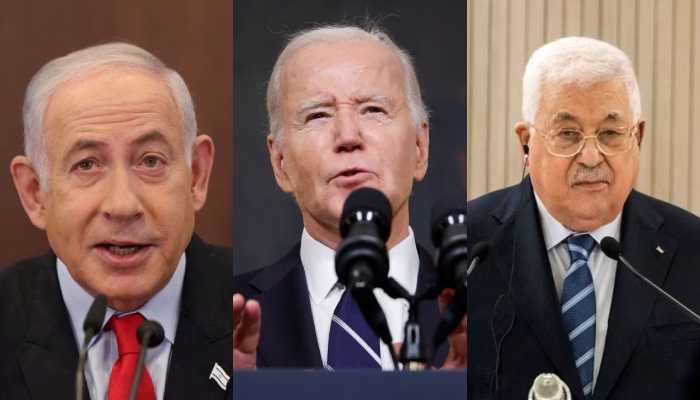
Biden also spoke with Palestinian President Mahmoud Abbas, who stressed the urgent need to allow urgent humanitarian aid corridors in Gaza.
During the conversation, Biden condemned Hamas' actions, characterising them as a brutal attack on Israel and expressed his belief that Hamas does not represent the Palestinian people's desire for dignity and self-determination.
Furthermore, President Biden pledged "full support" to the Palestinian Authority in its efforts to provide humanitarian aid, particularly to those in Gaza.
More than 1,300 people were killed as a result in Israel.
In a call with his Israeli counterpart, Yoav Gallant, US Secretary of Defense Lloyd Austin emphasised the importance of adhering to the laws of war, including obligations to protect civilians, and addressed the deteriorating humanitarian situation in Gaza.
‘Situation is catastrophic’
The alarm was grown over the fate of Palestinian civilians in blockaded and besieged Gaza — one of the world´s most densely populated areas, home to 2.4 million — if it becomes the scene of intense urban combat and house-to-house fighting.
Aid agencies have said forcing Gazans to move is impossible while the war rages.
But with food, water, fuel and medical supplies running low because of an Israeli blockade, aid agencies are warning of a deepening humanitarian crisis.
"The situation is catastrophic," said Jumaa Nasser, who travelled from Beit Lahia in northern Gaza with his wife, mother and seven children.
"We've had no food or sleep. We don't know what to do. I've given my fate up to God," he told AFP.
The World Health Organization said Saturday that forcing thousands of hospital patients to evacuate to already overflowing hospitals in the southern Gaza Strip could be "tantamount to a death sentence".
Exiled Hamas chief Ismail Haniyeh accused Israel Saturday of committing "war crimes" in Gaza but he ruled out any "displacement" of Gazans, including to Egypt.
On the diplomatic front, Chinese envoy Zhai Jun will visit the Middle East next week to push for a ceasefire and promote peace talks, CCTV reported Sunday.
Saudi Arabia has also pressed for an "immediate ceasefire". Russia said it had asked the UN Security Council to vote on Monday on its ceasefire resolution.
International aid agencies, including the UN and Red Cross, plus several foreign diplomats are concerned about the feasibility of the evacuation plan.
"We fear an unprecedented humanitarian catastrophe," said Ivan Karakashian, of the Norwegian Refugee Council.
More than 423,000 Palestinians have already left their homes, and 5,540 homes have been destroyed, according to the UN.
Air strikes
Israel, which has likened last week's attacks to those on September 11, 2001, in the United States, has fired thousands of missiles at northern Gaza.
One air strike martyred Ali Qadi, described as "a company commander of the Hamas 'Nukhba' commando force" involved in the unprecedented attack, the army said.
"Localised" raids have also taken place, as Israeli troops encircle the Gaza Strip, said army spokesperson Jonathan Conricus.
"We will likely evolve into additional significant combat operations," he added. "When we do so, remember how this started... all of this is Hamas-made."
But National Security Adviser Tzachi Hanegbi admitted intelligence lapses that failed to spot the attack in advance.
The Hamas attack and the war it sparked — Gaza's fifth in 15 years — have upended Middle Eastern politics, prompting fears that the violence will spread across the volatile region.
Palestinian Prime Minister Mohammad Shtayyeh accused Israel of "genocide" in Gaza, while clashes in the occupied West Bank have martyred 53 Palestinians in the past week.
Angry protests condemning Israel and supporting the Palestinians in Gaza took place across the Arab world Friday.
Western capitals, including London and Washington, also saw pro-Palestinian marches.
Northern threat
Israel faces the threat of a separate confrontation on its northern border with Lebanon and artillery exchanges have taken place with the Iran-backed Hezbollah group in recent days.
On Friday, a Reuters video journalist was killed and six other reporters, from AFP, Reuters and Al-Jazeera, were wounded in shelling that Lebanon blamed on Israeli forces.
Two Lebanese civilians were killed in Israeli shelling of a southern village on Saturday, its mayor told AFP. Hezbollah said one of its fighters was killed by Israeli fire.
Israeli military spokesperson Hagari Saturday night warned that the army "has very large forces in the north."
"Whoever reaches the fence to infiltrate Israel, will die," he said in televised remarks.
A potential Israeli ground invasion has also increased fears for the safety of the 150 hostages, including foreigners, that Israel said Hamas seized during its deadly rampage.
Hamas has threatened to kill the hostages one by one for every unannounced Israeli air strike.




